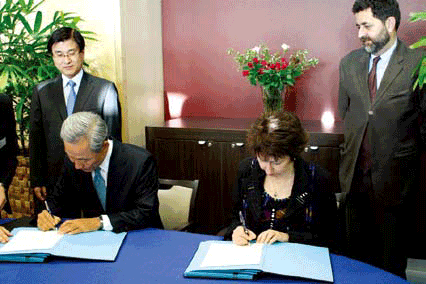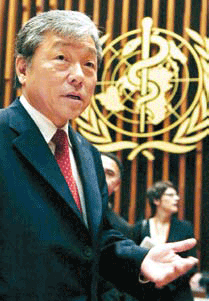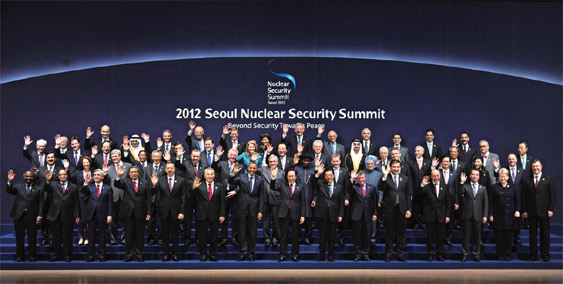International Relations
The Republic of Korea, founded in 1948, upholds the values of democracy and free-market economy. The Cold War confrontation that emerged in the aftermath of World War II divided the world into two antagonistic blocs, and the Republic of Korea aligned itself with the democracies of the West. As the Cold War intensified, the Republic of Korea focused on further cementing ties with its traditional allies and building cooperative relations with Third World nations. Since the 1970s, South Korean diplomacy has been aimed at promoting the peaceful reunification of the peninsula. To this end, South Korea has bolstered ties with allies and played an active role in the international arena.
Having laid a firm basis for its diplomacy, the Republic of Korea continued throughout the 1980s to forge cooperative partnerships with various nations in a wide array of fields. In the late 1980s and early 1990s, the Republic of Korea responded swiftly to the epochal changes in Eastern Europe and in the former Soviet Union, changes which effectively brought an end to the Cold War by actively pursuing the so-called “Northern Diplomacy.”
This led to the establishment of diplomatic relations with former Communist Bloc countries. South Korea’s normalization of relations with these countries, including the Soviet Union and China, brought a truly global aspect to its diplomacy. However, the crowning achievement of the Northern Diplomacy occurred in September 1991 when South and North Korea simultaneously joined the United Nations. The signing by South and North Korea of the Agreement on Reconciliation, Nonaggression and Exchanges and Cooperation (the South-North Basic Agreement) and the Joint Declaration of the Denuclearization of the Korean Peninsula in December 1991 was designed to pave the way for peaceful coexistence and prosperity of the two Koreas.
Economic Exchanges
The end of the Cold War ushered in a new trend in the form of regionalism. Countries which pursued export-led growth such as the Republic of Korea found themselves facing a new international economic environment. Korea’s export-led growth has been largely dependent on trade with advanced countries such as the United States, Japan and the European Union. This situation has often led to frictions over trade imbalances. However, Korea’s reliance on trade with advanced countries has steadily declined as trade with developing countries has increased.
As its economy shifts from labor-intensive to technology-intensive industries, South Korea is expected to expand its trade with developing countries and the nations of Eastern Europe, given the growing complementarity of their economies, thus making a greater contribution to the development of the global economy. With industrialized countries that remain crucial as partners not only in trade but also in the area of science and technology, Korea will endeavor to minimize friction through the reciprocal opening of its industrial, agricultural, and service sectors.
The Republic of Korea is committed to global trade liberalization, and is an active participant in the Doha Development Agenda negotiations launched in 2001. As of March 2012, South Korea had effectuated a total of eight FTAs with 45 countries, including the United States, Chile, Singapore, EFTA, ASEAN, India, the EU, and Peru. The country has also signed FTAs with Turkey and Columbia and these are waiting for effectuation. The country is currently engaged in FTA-related negotiations with Australia, New Zealand, Canada, GCC, and Mexico. The country aims to contribute to regional integration within East Asia through FTAs with China and Japan.
International Peace and Cooperation
Since the Republic of Korea joined the United Nations in 1991, it has played an ever more active role in the efforts to address a whole range of global issues, acting both as a regional facilitator and an influential international actor. In 1996-1997, Korea served as a non-permanent member of the Security Council. During this period, it played an important role in advocating the protection of civilians caught up in armed conflicts. Korea held the Presidency of the 56th Session of the General Assembly in 2001, and in 2006, former Korean Foreign Minister Ban Ki-moon was elected the 8th Secretary-General of the United Nations.
U.N. Secretary-General, Ban Ki-moon
Ban Ki-moon of the Republic of Korea, the eighth Secretary-General of the United Nations, brings to his post 37 years of service in government and on the global stage. At the time of his election as Secretary-General, Mr. Ban was his country’s Minister of Foreign Affairs and Trade.
“My heart is overflowing with gratitude toward my country and people who have sent me here to serve. It has been a long journey from my youth in war-torn and destitute Korea to this rostrum and these awesome responsibilities. I could make the journey because the UN was with my people in our darkest days. It gave us hope and sustenance, security and dignity.
It showed us a better way. So I feel at home today, however many miles and years I have traveled.”
Quote from Secretary-General Ban’s acceptance speech before the United Nations
Peacekeeping operations have emerged as a vital and powerful means for the UN to help countries torn apart by armed conflict. Fully aware of the importance of international peace and security in light of its own experience of post-war nation-building, Korea has actively participated in UN peacekeeping operations in 11 missions including those in Lebanon and Haiti as well as in cease-fire monitoring and confidence-building efforts. Korea has also contributed to initiatives to assist local communities’ attempts to recover through the provision of medical services and assistance with local construction projects.
As a strong advocate of human rights, Korea upholds the universal values of human rights as a centerpiece of its policy goals. Korea, which has been a member of the Human Rights Council since its establishment in June 2006, has actively engaged in the activities of the Council, cooperating with the international community in advancing human rights and responding to serious human rights situations in a timely and efficient manner. Furthermore, as a state party to seven core international human rights conventions, Korea is fully committed to the efforts of the international community to promote and protect human rights.
Moreover, firmly committed to promoting democracy, Korea has actively participated in various initiatives at the global and regional levels, including the Community of Democracies, the Bali Democracy Forum, and the Asia-Pacific Democracy Partnership. In December 2010, President Lee Myung-bak participated in the 3rd Bali Democracy Forum, as a co -chair with Susilo Bambang Yudhoyono, President of Indonesia, and introduced Korea’s experiences of democratization, emphasizing the significance of democracy in building peace and stability.
Korea has also been an active player in global efforts to strengthen the disarmament and non-proliferation regimes. The annual international conference co-hosted by Korea and the UN Office for Disarmament Affairs since 2002, the so-called “Jeju Process,” has provided a meaningful platform for promoting discussions on various themes in the field of disarmament and non-proliferation. Korea’s joining the Proliferation Security Initiative (PSI) in May 2009 stands as another manifestation of its willingness to take part in the global efforts to prevent the proliferation of weapons of mass destruction (WMD) and their means of delivery. Korea has participated in PSI activities and events since then and will continue to contribute to strengthening the PSI counter-proliferation networks.
The late Dr. Lee Jong-wook (1945~2006)
Prior to his work as WHO Director-General, Dr. Lee was a world leader in the fight against two of the greatest challenges
to international health and development – tuberculosis, and vaccine preventable diseases of children
As part of efforts to contribute to reconciliation and cooperation at the global level, Korea has fully committed itself to cultural exchanges with foreign countries. In order to deepen awareness and understanding of Korean art and culture abroad, the Korea Foundation, established in 1991, supports overseas Korean Studies programs as well as numerous academic conferences and a vast array of international cultural programs.
Since the G20 was launched in November 2008 in the midst of the unprecedented global financial and economic crisis, Korea has played an active part in it and supported its role as the premier forum for international economic cooperation. President Lee suggested the lifting of trade and investment restrictions to prevent the rise of protectionism, which was agreed at the Washington Summit and reaffirmed at the London Summit in April 2009. Having weathered the Asian financial crisis in the late 1990s, Korea helped provide the direction in which the G20 should move to prevent a recurrence of such crises in the future. As a result, Seoul was chosen as the host city for the G20 Summit in November 2010, which reflects the international community’s recognition of Korea’s efforts and global leadership.
In March 2012, the Nuclear Security Summit was held in Seoul to discuss ways of joint collaboration for global nuclear security.
It was the second time the event was held after the first one in Washington DC in April 2010.
Korea’s Development Cooperation
From 1945 until the early 1990s, Korea received various forms of development assistance from the international community. This assistance served as a valuable resource in terms of Korea’s phenomenal economic development. As part of the efforts to contribute to the international community, Korea attaches great importance to development cooperation. In particular, Korea is striving to help meet the Millennium Development Goals (MDGs) set by the United Nations, and to this end, is planning to gradually expand its Official Development Assistance (ODA). In 2011, Korea provided a total of US$1,324 million worth of ODA; and plans are currently in the works to expand this amount to 0.25% of its Gross National Income (GNI) by 2015. Moreover, Korea successfully joined the Organization for Economic Cooperation and Development (OECD)’s Development Assistance Committee (DAC) in 2009 and started its activities on January 1, 2010.
Korea’s ODA administration system includes bilateral and multilateral assistance. Bilateral assistance is divided into grants and concessional loans. Grants, composed of grants and technical cooperation programs, are implemented by the Korea International Cooperation Agency (KOICA) in accordance with the policy guidelines set by the Ministry of Foreign Affairs and Trade (MOFAT). While grant aid programs are implemented exclusively by KOICA, some technical cooperation programs are being carried out by other government agencies and organizations. Concessional loans are managed by the Economic Development Cooperation Fund (EDCF) programmed by the Export-Import Bank of Korea (Korea EXIM Bank) under the supervision of the Ministry of Strategy and Finance.
Global humanitarian issues such as food insecurity, natural disasters and violent conflicts require further action by Korea. Korea therefore strives to provide more effective and coordinated humanitarian assistance, maintaining efforts to scale up its aid contributions every year. Korea has committed itself to disburse US$100 million over three years (2009-2011) for food aid and agricultural development cooperation in developing countries, ultimately seeking to enhance global food security. Korea also offered emergency relief assistance of more than US$9 million to 20 disaster and conflict- stricken countries such as Haiti, Chile and Pakistan in 2010.
Korea has introduced in September 2007 an air-ticket solidarity levy domestically named as “the Global Poverty Eradication Contribution.” The idea of a small amount levied on airline tickets has been an international initiative to mobilize resources for development in an innovative way (innovative financing for development).
The Global Poverty Eradication Contribution is mainly disbursed to help scale up access to HIV/AIDS, tuberculosis and malaria treatments in Africa. A substantial portion of the Contribution has been allocated to UNITAID (the international drug purchase facility) and GAVI (Global Alliance for Vaccines and Immunization). And the rest of it is allocated to support projects by Korean development NGOs in the least developed countries in Africa. Korea aims to step up its international humanitarian assistance through effective and constructive means.
Future Policy Directions
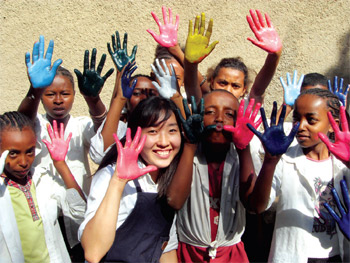
In line with its vision of a “Global Korea,” the Republic of Korea strives to carry out diplomacy in active cooperation with the international community. Transcending differences in race, religion and wealth, Korea will foster ties of friendship with all nations and peoples. Respecting the universal values of democracy and the market economy, it will also continue to take part in the efforts by the international community for peace and co-prosperity.
The Republic of Korea will spare no efforts to develop and further strengthen relations with countries of the world not only in bilateral issues but also in the course of addressing common global challenges. While striving to secure a safe and stable supply of resources and energy by promoting the “Low Carbon, Green Growth” policy, Korea will seek to play a significant role in the international efforts to combat climate change.
In November 2010, the Republic of Korea hosted the 5th G20 Summit, demonstrating an outstanding leadership in the adoption of measures to overcome the financial crisis. In doing so, the Republic of Korea contributed to creating a global financial safety net and planning the reduction of global poverty, all the while serving as a bridge between the developed and the developing nations. As the host country of the 2010 Summit, the Republic of Korea will strive to take part in achieving a strong, sustainable, and balanced growth of the global economy.
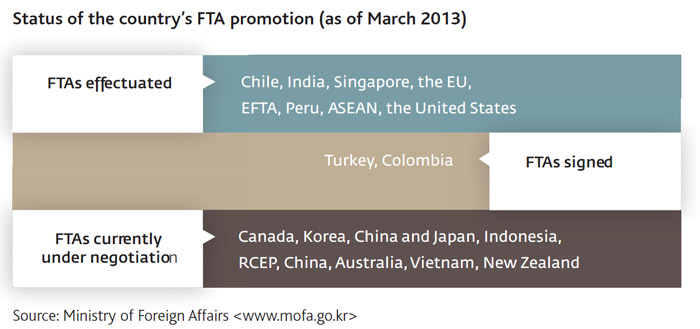
The Republic of Korea government has pledged it will contribute to the promotion and protection of universal values regarding international peace and human rights in a manner that reflects its economic size and global standing as a responsible member of the international community. To this end, the Republic of Korea will actively participate in UN peacekeeping operations, and expand Official Development Assistance (ODA).
Korea’s bilateral ODA by region (2010)

